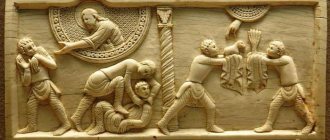Why did Christ choose to suffer?
Photo: Tagileparhiya.ru
When Christians say “this is your cross and you need to bear it with dignity,” they remember the distant events of the time of Jesus Christ. The Lord chose suffering and death on the cross, on which robbers, murderers and criminals of that time were usually crucified. Through his suffering, Christ took upon himself the sins of humanity. Christ was not only killed on the cross, but also carried it all the way to Golgotha in terrible torment, falling under the weight of his cross. Imitating Christ, many Christians also bear their own cross of suffering, believing that by doing this they give themselves access to eternal life.
Self-torture and artificially attracting troubles to oneself, characteristic of sects, have nothing in common with Orthodox crucifixion.
What does the expression “Carry your cross” mean?
Many people use popular expressions in their speech, not always understanding their meaning. What does the expression “Carry your cross” mean?
Chairman of the Financial and Economic Administration of the Russian Orthodox Church, Metropolitan Mark of Ryazan and Mikhailovsky:
— The first thing to note: in this expression the word “cross” is used in a figurative sense. The cross in this case is fate, life’s difficulties and trials that accompany a person throughout his entire earthly journey.
And for centuries, the main goal of most people’s lives was the desire to avoid, protect, protect themselves and their families from difficulties and trials and find a calm, serene life. This natural human desire was reflected, among other things, in the words of the church prayer: “Let us live a quiet and silent life in all piety and purity...”
However, life without sorrows is impossible in this world, which lies in evil. And here the main question is not how to deal with them, but how to perceive them, how to relate to all these difficulties and sorrows. How about an inevitable evil that poisons life and makes you suffer? Or... how about a blessing?
The Holy Fathers, speaking about sorrows, revered them for the manifestation of God's attention to us, sinful people. They called sorrows and illnesses a visitation from God.
Yes, human life is a series of trials. But trials that should temper our soul, cleanse it and make it a worthy heir to the Kingdom of Heaven. In our sorrows, we are already heirs of Christ, Who took upon Himself, of His own free will, a terrible fate - He ascended the Cross, He experienced unbearable suffering - for our sake! In order to grant salvation to all humanity.
There is an expression: “The Lord endured and commanded us.” Thus, to bear our cross means, patiently, with Christian humility, following the example of Christ, to bear all the hardships that befall us.
And one more important point! The Church tells us that everyone is assigned a cross according to their strength. In this regard, in conclusion I will tell you the following parable. One man suffered greatly from the thought that his life was excessively difficult, that he had suffered too much grief and misfortune. And he really asked God to give him a lighter cross in life. The Lord took pity on this man and invited him into a room where there were many life crosses of different sizes and weights against the walls, and invited the man to choose the cross that seemed most suitable. The man chose for a long time. Walked around the room. I looked closely. Weighed it. And finally, in the farthest corner I saw a small cross and joyfully exclaimed: “This one, Lord! I want this one!” And the Lord smiled and said: “Take it, child! This is your cross!”
Suffering as a factor in personality development
Suffering is an important factor in human development. Without it, personal maturity is impossible. Suffering has a non-religious meaning. They help a person cut out his real self, cutting off everything unnecessary. And like any other, an operation of this kind is very painful.
To the question of what it means to “carry your cross”, you can answer this way: it means silently enduring hardships, problems, sorrows, without complaining about fate. Another thing is why? After all, you need a higher goal in order to grit your teeth and move on. But here, at this point, each person makes his own choice.
Same attitude
When, during his lifetime, the Lord Jesus told His disciples to take up their cross, He spoke about the relationships that each of them needs to have and without which it is impossible to follow Him. The attitude of the disciples should be the same as that of Jesus:
Then Jesus said to His disciples: If anyone wants to come after Me, let him deny himself, and take up his cross and follow Me, for whoever wants to save his life will lose it, but whoever loses his life for My sake will find it.
(Gospel of Matthew 16:24-25)
This attitude that Jesus had and that He requires of us involves self-denial and the sacrifice of life for the sake of Christ and the Gospel.
When is the time to take up your cross?
When you make a decision to die to yourself and live only for Christ and the Gospel. When you become detached from yourself forever. When you, by faith and through repentance, enter the New Covenant of Jesus Christ. The Apostle Paul said this about himself:
But I do not want to boast, except in the cross of our Lord Jesus Christ, by which the world has been crucified to me, and I to the world.
(Galatians 6:14)
Source
If you found it useful and interesting, save it to your personal page or share with friends on social networks! Links below...
- Seal
- Tumblr
- Skype
Liked this:
Like
The instrument of Christ's death and the salvation of mankind
Christ showed the first example of bearing the cross to humanity. After the incarnation, the most difficult trials awaited him: the hatred of the Pharisees, the betrayal of Judas and painful death. By the way, at that time crucifixion was considered the lowest and most shameful death.
It turns out that Christ, innocent of anything, voluntarily endured all the humiliation in order to save people from original sin. Therefore, the cross is often associated with an instrument of salvation and suffering at the same time, and without worthy enduring of sorrows, the Kingdom of Heaven remains inaccessible to many.
Purifying Fire of Suffering
But not everything was so optimistic for the prophet himself. When Christ preached, he sacredly believed in what he said. However, having gone through all the trials, even he doubted himself, his faith and even God. No wonder on the cross Jesus exclaimed: “Father, why have you forsaken me!”
Many books have been written about this phrase and different researchers try to interpret it this way and that. But one thing is certain: it proves that the feat of Christ provides a certain standard for human courage in general. Because in fact, when he was carrying the cross and experiencing terrible suffering, he still did not know whether the Father would save him or not. That is why the meaning of the phraseological unit “to bear the cross” (the expression and image of a suffering prophet) calls not to grumble at fate, but to steadfastly endure its blows, no matter how long they last.
Suffering, pain, various sorrows make existence meaningless - such is their nature. A person must resist the loss of meaning and remember the feat of Christ, regardless of whether he believes or not. Let him imagine that Christ was a simple son of a carpenter, who, by mistake (false denunciation), was crucified on the cross.
And here the meaning of the phraseological unit “to bear the cross” (this expression is stable in the language) acquires not only everyday, but also ethical, highly moral meaning.
And still we need to end somehow positively. Perhaps the fact that Christ suffered much more when he made the way of the cross is not enough for some. Such readers are quite understandable.
Christ's Path to Calvary
Let's start with the origin. Naturally, this expression (“carry your cross”) refers us to the biblical story of how the Son of God was condemned to death. Jesus, as we know, carried his own cross. His path was difficult and painful, but he still mastered the road and drank the bitter cup to the bottom. This is the origin of the expression “carrying your cross.” The meaning of the phraseological unit will be revealed further.
You can't be saved if you don't want to bear the cross
The Bible describes the following incident:
When He set out on the road, someone ran up, fell on his knees before Him and asked Him: Good Teacher! What must I do to inherit eternal life? Jesus said to him: Why do you call Me good? No one is good except God alone. You know the commandments: do not commit adultery, do not kill, do not steal, do not bear false witness, do not offend, honor your father and mother. He answered and said to Him: Teacher! I have kept all this from my youth. Jesus, looking at him, loved him and said to him: you lack one thing: go, sell everything that you have and give to the poor, and you will have treasure in heaven; and come, follow Me, taking up the cross. He, embarrassed by this word, went away sad, because he had great property.
(Gospel of Mark 10:17-22)
As we see from here, this man wanted to inherit eternal life and lived correctly. But that wasn't enough. The Lord Jesus had no need of his property, but He saw that the property was an idol for him, which remained tied to him. His love of possessions prevented him from taking up the cross and following Jesus.
Is there something in your life, some person, or some goal to which you are so attached that you cannot completely devote your life to Christ and cannot take up and carry your cross. Don't let yourself be deceived and upset. Take up your cross and follow in the footsteps of Jesus Christ, the King of Kings and Lord of Lords, who bore His cross to bring eternal salvation. What is the difference between the cross of Christ and the cross that a Christian must bear?
If God sends you trials, it means you will pass them
When everything in a person’s life goes smoothly, smoothly and well, no one says that this is his path, but when illnesses, misunderstandings, losses come, everyone remembers what’s going on.
Sometimes it seems to a person that he cannot withstand all the trials that befall him. But Orthodoxy says that each person is given exactly as much as he is able to withstand.
I have repeatedly become convinced that if there are too many things to do, sorrows, and worries, God will either remove individual tasks from us or send people who will help us cope, calm us down, encourage us, and pray. The Gospel indicates the name of the man who helped carry the Savior’s Cross. It was Simon of Cyrene. In the most confusing situations, a person is helped to understand by parents, spouses, friends, and most importantly, God.
It’s easy to talk about sorrows and experiences when everything is joyful and rosy for you. But only those who have verified with their own experience that the loss of relatives, serious illnesses and problems at work are only trials, and not the end of life, can truly console and sympathize.
Superficial observation of people usually leads to subjective conclusions: it’s hard for me, but for others everything is so easy! Before you say once again that everything is presented to Nadka from the third entrance on a saucer with a blue border, and Kostya from the fourth floor, thanks to his parents, is provided for 200 years in the future, stop and think. How do you know what is going on in the souls of these people? Are they going through some kind of deep upheaval?










